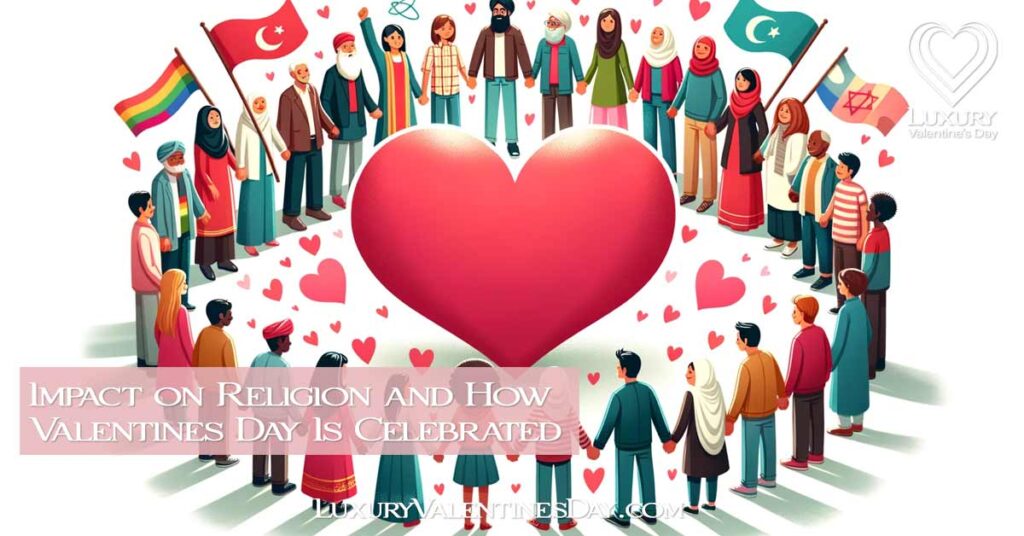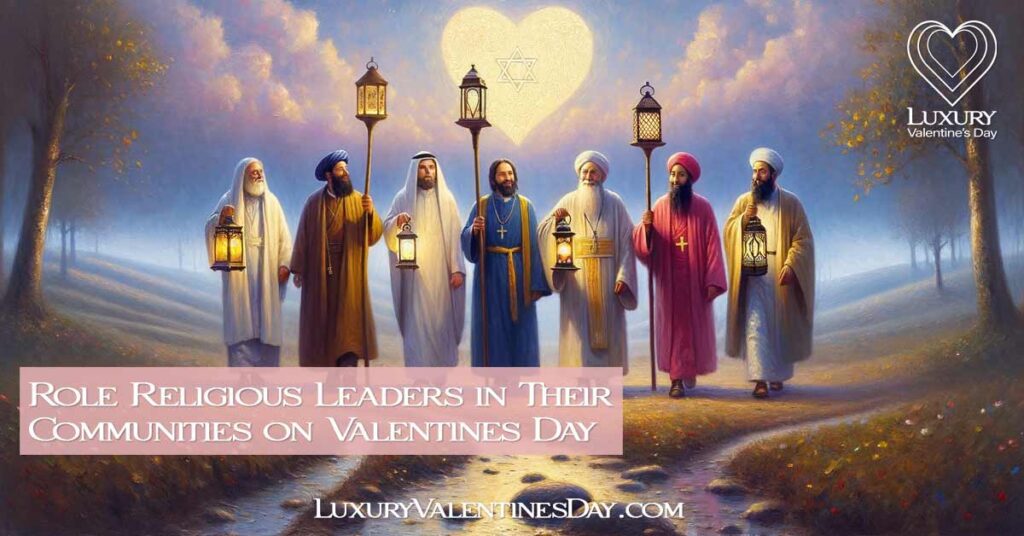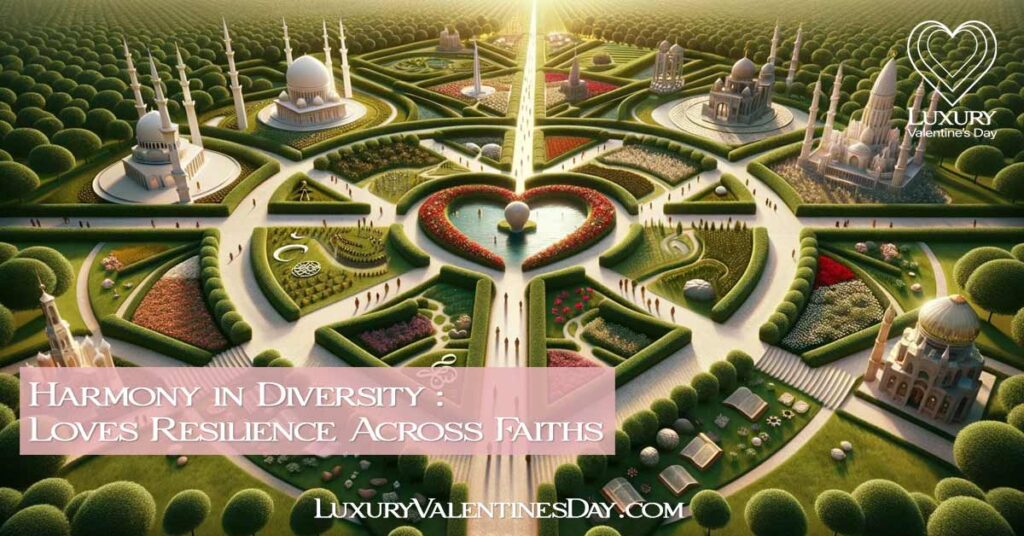Table of Contents
ToggleIs Valentine’s Day Religious?
As you sip champagne in a five-star suite, have you ever wondered about the spiritual tapestry that makes Valentine’s Day what it is today? Understanding these differences in religious perspectives—what religion celebrates Valentine’s Day, what religions do not, and why—is crucial to promoting tolerance and inclusivity in our society.
The Secular Celebration
Valentine’s Day, with its intriguing history and multifaceted evolution, has transcended its origins to become a widely recognized secular celebration today, often marked by luxury getaways and gourmet dining. We journey through time to unravel the fascinating story behind this holiday, understanding how it has morphed into a global phenomenon focused on love, affection and high-end experiences.
Exploring the Origins: Is Valentine’s Day a Religious Holiday?
Valentine’s Day, as we know it, has a rich history (learn more about Val Day’s history) dating back to ancient Rome. While the exact origins are shrouded in legend and folklore, it is widely believed to have been inspired by Saint Valentine, a Christian martyr who lived during the Roman Empire. However, it wasn’t until the Middle Ages that the romantic and luxurious connotations of the holiday began to take shape.
Take a look at the following article If you would like to learn more about the dark truth about Valentine’s Day.
The Evolution into a Secular Celebration
Over the centuries, Valentine’s Day transformed from a religious observance into a more secular celebration of love. Do all religions celebrate Valentine’s Day? Not necessarily. The holiday shed some of its religious overtones, and its observance became increasingly focused on the romantic aspects of relationships. Today, it is a day when people express their love and affection for one another through gestures, gifts, and acts of kindness.
The Globalization of Love
One of the most remarkable aspects of Valentine’s Day is its globalization. Originally celebrated in a few countries, it has now spread far and wide, transcending cultural and geographical boundaries. Its message of love and affection resonates with people of all backgrounds, making it a truly universal celebration.
The Commercialization Phenomenon
As Valentine’s Day (also referred to as Val Day, Saint Valentine’s Day or the Feast of Saint Valentine) gained popularity, it also underwent a significant transformation through commercialization. This transformation is perhaps most visible in the surge of advertisements, promotions, and sales campaigns leading up to the holiday. The commercial aspect of Valentine’s Day has led to a boom in the sale of flowers, chocolates, greeting cards, and various romantic gifts.
While some may argue that commercialization has taken away from the genuine sentiment of the holiday, it has undeniably played a significant role in making Valentine’s Day a global cultural event. The holiday generates a considerable economic impact in many countries, with businesses capitalizing on the opportunity to market their products and services to couples celebrating their love.
The secular celebration of Valentine’s Day, with its historical roots, global reach, and commercialization, has become an enduring tradition that symbolizes love and affection. It has transcended the boundaries of religion and culture to touch the hearts of people worldwide, making it a day to celebrate and cherish love in all its forms.
The Impact on Religion and How Valentine’s Day Is Celebrated

Valentine’s Day holds a unique place in the hearts of people from diverse religious backgrounds. While there is no doubt it has Christian origins and connections to Saint Valentine, it is now celebrated by individuals of various faiths, each bringing their own perspectives to this special day.
Christianity and Valentine’s Day
For many Christians, Valentine’s Day aligns with their faith’s emphasis on love, compassion, and the sanctity of marriage. The holiday is seen as an opportunity to express love for one’s partner, family, and friends. The connection to Saint Valentine, a Christian martyr who lived in the Roman era, adds a layer of religious significance to the celebration.
However, Christianity is a religion that covers a broad spectrum and has an estimated 2 billion followers across the world. Jehovah’s Witnesses are one section of the Christian family that typically do not celebrate Valentine’s Day. This choice is based on their religious beliefs and practices. Jehovah’s Witnesses are known for their strict adherence to a set of religious principles and abstain from many secular holidays and celebrations, including Valentine’s Day.
The reasons behind Jehovah’s Witnesses not celebrating Valentine’s Day are tied to their interpretation of the Bible and their desire to maintain a separation from what they view as worldly customs and practices. They believe that many holidays, including Valentine’s Day, have pagan or non-Christian origins and are rooted in traditions that do not align with their faith.
Islam and Valentine’s Day
In Islam, the perspective on Valentine’s Day varies. While some Muslims choose to celebrate the holiday as a day to express love and affection within the bounds of Islamic principles, others may view it with caution, as it is considered a secular observance with Christian roots. Equally, Islamic principles, such as the importance of modesty and avoiding unnecessary extravagance, can influence these decisions. Interpretations and practices differ among individuals and communities, reflecting the diversity within the Muslim world.
Hinduism and Valentine’s Day
In Hinduism, the celebration of love is an integral part of the cultural fabric. While Valentine’s Day may not have religious origins within Hinduism, the holiday aligns with the reverence for love, relationships, and the celebration of these emotions in Hindu culture. Hindu couples often embrace Valentine’s Day as an opportunity to express their affection.
Judaism and Valentine’s Day
Within the Jewish community, perspectives on Valentine’s Day can vary. Some Jewish individuals and couples may choose to participate in the celebrations, considering it a secular holiday centered on love and relationships. However, others may refrain from its observance due to its non-Jewish origins.
The Role of Religious Leaders in Guiding Their Communities on Valentine’s Day

Religious leaders hold a unique position of influence and guidance within their respective communities. They play a pivotal role in shaping the perspectives and practices of their followers, including how they approach secular holidays such as Valentine’s Day. They act as moral compasses for their communities, offering guidance based on their interpretation of religious teachings. Their role extends beyond matters of worship and doctrine and includes providing insight into how secular observances, like Valentine’s Day, align with or diverge from their faith’s principles.
Pope Francis, the head of the Roman Catholic Church, has emphasized the importance of love and family in his messages on Valentine’s Day. He has encouraged Christians to use the occasion to express love and care for their partners and family members.
Views within the Islamic community vary, but some prominent Islamic leaders have expressed caution regarding Valentine’s Day. Sheikh Muhammad Salih Al-Munajjid (also known as Muhammad Al-Munajjid), a well-known Islamic scholar, has expressed reservations about the holiday, considering it an imitation of non-Muslim practices. He advises Muslims to avoid celebrating it.
Harmony in Diversity: Love’s Resilience Across Faiths

Valentine’s Day, once intertwined with religious significance, has gracefully transitioned into a global secular celebration focused on love and affection. While its Christian origins are unmistakable, it now finds resonance among individuals from various faiths, each bringing their unique perspective to this special day.
The global celebration of Valentine’s Day offers a poignant reminder that love is a universal language that transcends religious and cultural divides. It serves as an opportunity for individuals from diverse backgrounds to express their affection, reinforcing the notion that love knows no boundaries.
As we conclude our exploration of the intricate relationship between religion and Valentine’s Day, we find that while traditions and interpretations may differ, the message of love endures as a common thread that unites people around the world. So, while not all religions celebrate Valentine’s Day directly, all promote love and caring, which is most important in today’s world.
Do you want to learn more about the history of Valentine’s Day?
Check out our latest article, “From Love Letters to Luxury: A Journey Through the History of Valentine’s Day Cards“
Related Posts
- Hug Day – February 12: Embracing Affection in Luxury
- Garlic Butter Lobster Tail for a Romantic Valentine’s Day Dinner
- Lace Sugar Decorated Cookies: How to Create Elegant Cookie Designs
- 40+ Valentine’s Day Cabinet Décor : Simple Touches That Make a Big Difference
- Date Ideas That Start with B: Brilliant and Beautiful Dates
- Cupid Unveiled: The Ultimate Guide to Love’s Most Iconic Messenger













